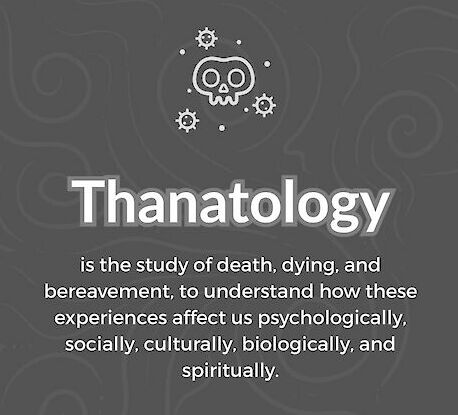What is Thanatology
Among the million things I (embarrassingly) didn't know in 2016 when I started working on Help Texts (we were called Grief Coach back then), is that there's an incredible field of study called Thanatology, and that the world is full of (IMO undervalued) Thanatologists who make the end of life experience better. Much better.
I'm so grateful to have Thanatologists on my team. Melissa Lunardini, PhD, MA, MBA, FT and Rah Adams, MS, CT lead our research, subscriber support, and client care work, and help us make the end of life experience safer and more manageable for the rest of us. I'm also so grateful to work with Th anatologists around the world, who are expert contributors at Help Texts and help us craft personalized text messages for our subscribers. Shout outs to Jillian Blueford, PhD, LPC, NCC, CT, FT, Rachelle Bensoussan M.A., CT, OAMHP., Cole Imperi, Andrew J. Vitale, C.T., Stephanie Heitkemper, and Pamela Gabbay, EdD., FT.
anatologists around the world, who are expert contributors at Help Texts and help us craft personalized text messages for our subscribers. Shout outs to Jillian Blueford, PhD, LPC, NCC, CT, FT, Rachelle Bensoussan M.A., CT, OAMHP., Cole Imperi, Andrew J. Vitale, C.T., Stephanie Heitkemper, and Pamela Gabbay, EdD., FT.
If you hadn't heard of Thanatology until now, here's your primer.
Thanatology is the study of death, dying, and bereavement, focused on understanding how these experiences affect us psychologically, socially, culturally, biologically, and spiritually.
And here's a little more detail about each area, which I find helpful to refer back to.
🧠 Psychological - How grief rewires our brains and changes our identity
👥 Social - The way communities respond to death and support the bereaved
🌍 Cultural - Rituals, beliefs, and practices around death across different societies
🫀 Biological - The physical toll of grief on our bodies and immune systems
✨ Spiritual - Questions of meaning, afterlife, and transcendence during loss
----
About Help Texts
Help Texts is the world's leading clinically sound, scalable, bereavement intervention. We deliver affordable, multilingual support globally via text message for all of life's toughest moments. With extraordinary acceptability (95%) and 6-month retention (90%) rates, Help Texts' light-weight solution makes it easy for employers, providers, payers, and others to improve health and community outcomes, while also realizing significant cost savings for those in their care.
Life can be hard. Getting support shouldn't have to be. 💙 Help Texts is proud to be delivering personalized, expert grief and mental health support in 61 countries and 28 languages. All year long.